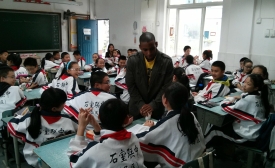international exchange
Joseph W. Westphal, ambassador of the United States to Saudi Arabia, met Higher Education Minister Khaled Al-Anqari on Thursday to discuss strengthening of educational relations between the US and Saudi Arabia.
Chinese Premier Li Keqiang and his Greek counterpart, Antonis Samaras, on Saturday witnessed the opening of the new Heraklion Archaeological Museum in Crete, pledging to beef up bilateral cultural exchanges. Describing civilizations as the crystallization of human wisdom, Li said cultural exchanges serve as an important basis for country-to-country relations.
Both the number and growth of Chinese students at American universities is one of the more startling phenomena in higher education. A welcome one, too: study abroad would seem to promise a future where U.S.-China relations might be characterized by greater firsthand knowledge of American culture among the Chinese. By generating greater understanding, their experience in the U.S. should also expand their sense of common interests, brightening prospects for cooperation between the world’s main powers.
The absence of a federal ministry of education and the largely circumscribed role of the federal government in education in both the United States and Canada result in international education policy falling between the cracks of federal (foreign-international affairs) and state-provincial (higher education) responsibility. The two jurisdictions thus provide an interesting comparative context to examine factors shaping the federal role in international education and consequently its influence on higher education.
A senior official of the Communist Party of China (CPC) called on Wednesday fordeepening cooperation with Portugal in cultural and people-to-people exchanges.
From students and interns to researchers and teachers, throughout the Western Hemisphere the opportunity to live in each other’s countries, learn each other’s languages, study together, and share knowledge is essential to our connected economies and our relationships. This is the premise of President Obama’s 100,000 Strong in the Americas initiative that aims to increase educational exchanges between the United States and Latin America, the Caribbean, and Canada.
In a ballroom at the Marriott Pere Marquette, municipal officials from Peoria and Jwaneng, Botswana, signed paperwork that begins to formalize a sister-city relationship between the communities. The process might be completed this summer. Jwaneng then would become Peoria’s fifth sister city. “These relationships don’t just happen,” Peoria Mayor Jim Ardis said during the culmination of a six-day visit by a 10-member Botswanan delegation. “They need to be nurtured.”

By Di Wu1







